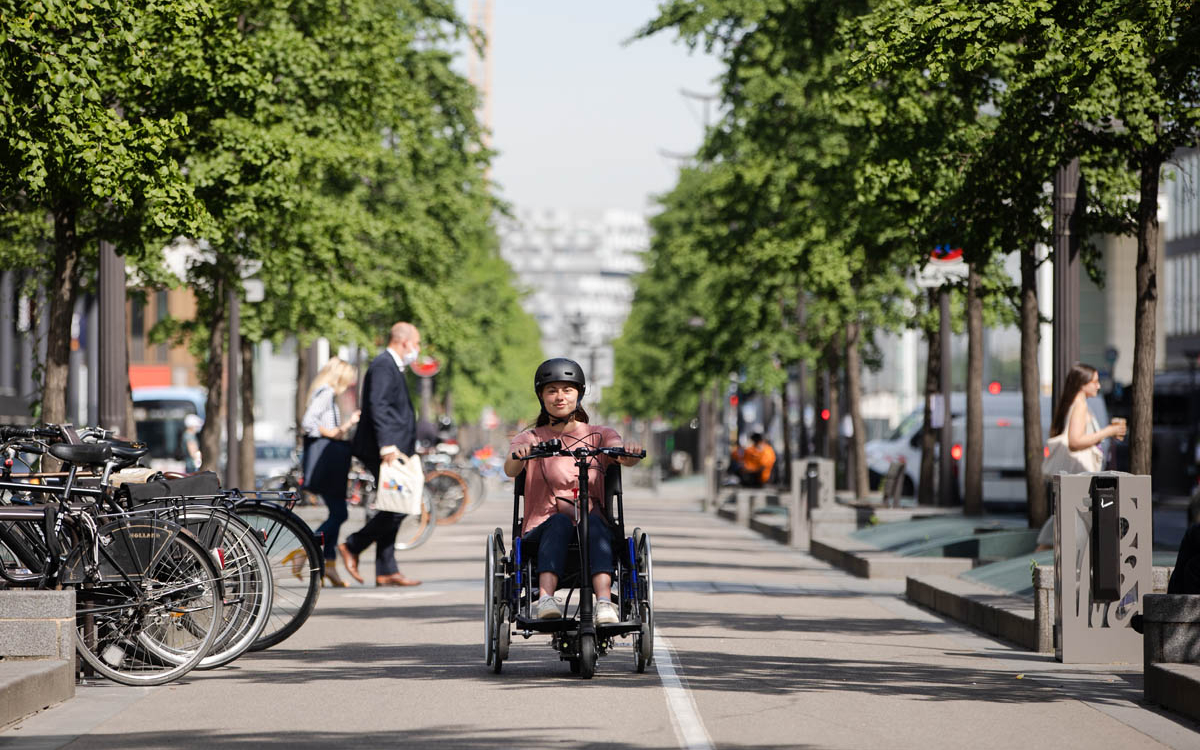Content
Cette page est aussi disponible en français
Hosting the Paris Paralympic Games from August 28th to September 8th means accelerating the city's development in terms of accessibility and inclusivity. Urban transformation is already visible in and several international events have been hosted in the capital.
With Paris set to welcome 350,000 visitors with disabilities, the City of Paris has undertaken major accessibility development work. In addition to its structural legacy, the city has developed genuine expertise in hosting major international para-sport events. This has also enabled the City of Paris to engage in inclusivity through sport.
Major para-sport events
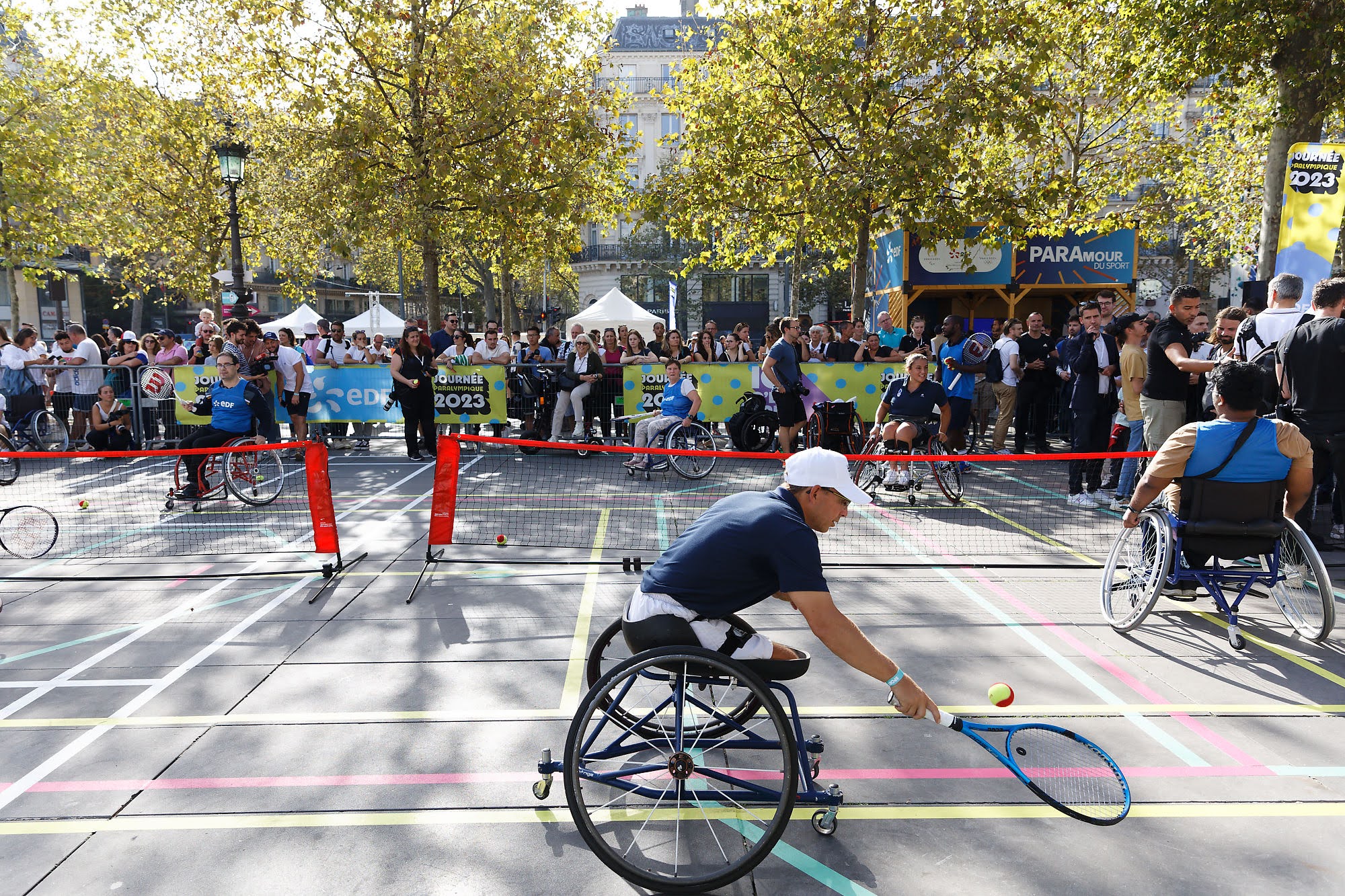
Paralympic Day at République.
Credit
Henri Garat / Ville de Paris
Passing on Paralympic culture involves hosting major events. In preparation for the Paralympic Games, Paris has held numerous events:
On October 8th, 2022, the first ever Paralympic Day was held at Place de la Bastille (Paris Centre). A year late, a new Paralympic Day was celebrated on October 8th.
From July 8th to 17th, 2023, Paris successfully hosted the World Para Athletics Championships , which drew over 102,000 spectators to the Stade Charléty (13th arrondissement) over ten days. In preparation for this event, long jump sand pits were renovated for para-athletics. Eight extra disabled parking spaces were added, as well as an elevator and two new restrooms.
From October 18th to 21st 2023, Paris hosted the International Wheelchair Rugby Cup at the Halle Georges-Carpentier (13th arrondissement), followed by the finals at the Accor Arena ( 12th arrondissement) on October 22nd, 2023. The world's top eight teams, including reigning European champions France, competed in this major para-sport event.
The City of Paris wants to maintain this momentum after the 2024 Games and host more international para-sport events.
Transforming transport
For the Paris Games, a whole range of new systems and modes of transport will be deployed to accommodate people with reduced mobility: use of reserved lanes for adapted public transport, 200 free shuttles to transport wheelchair users from major Paris stations to competition venues, 1,000 accessible cabs, 650 additional parking permits for cabs, and accessible pedestrian walkways.
Paris has almost 2,600 bus stops, 53% of which are currently accessible (more than 1,350 stops). It is planned to make all bus lines accessible before the Paris Games, i.e. around 400 additional stops.
An additional 1,000 disabled parking spaces will be added to the 4,400 existing ones.
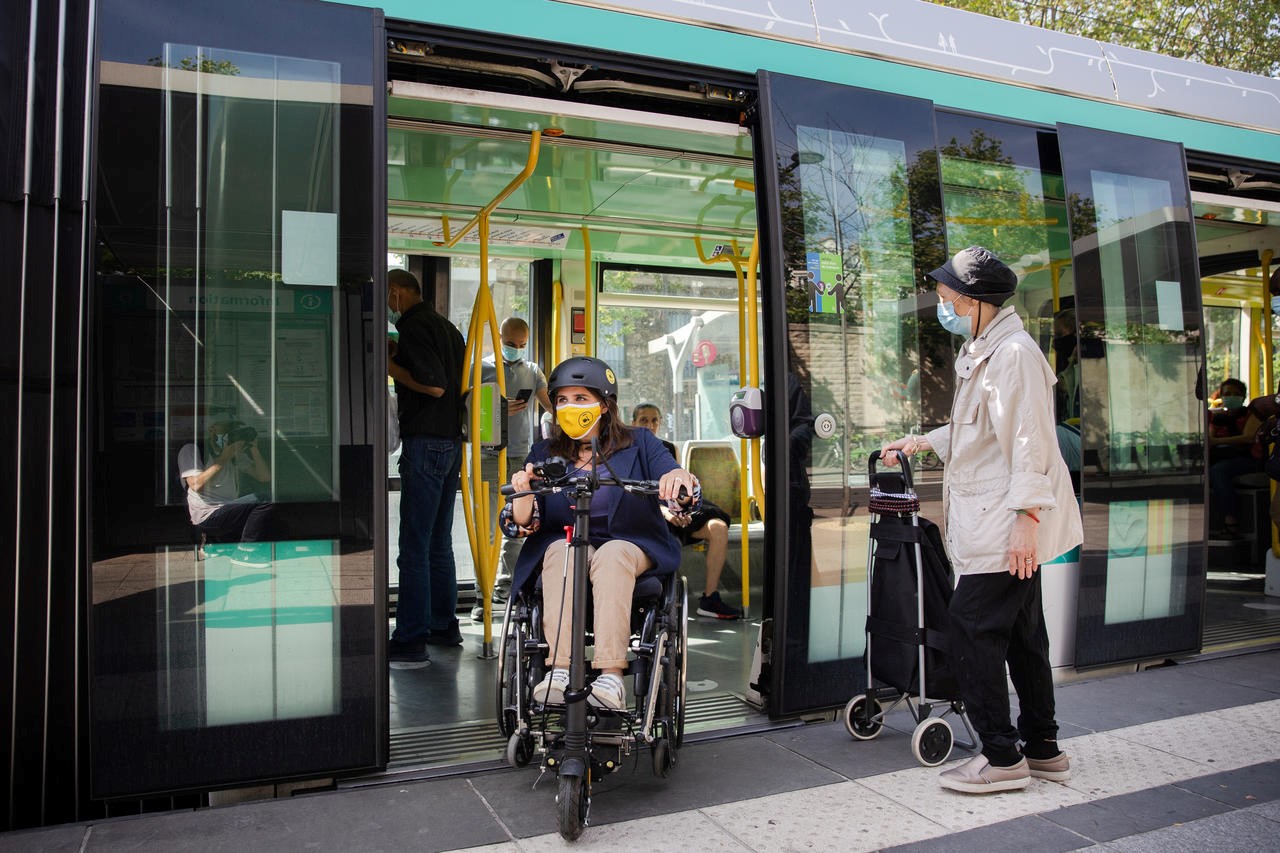
Credit
© Jean-Baptiste Gurliat / Ville de Paris
The RER A and B lines, the extension of the RER E (EOLE) and line 14 of the Paris metro, as well as 140 stations in the Ile-de-France region - notably those near the Olympic and Paralympic venues - are already accessible. The French government and IDFM have committed to making new metro and RER lines accessible, under the aegis of RATP, with 19 stations to be made accessible by mid-2024.
During the Paris Games
Accessing competition sites
A partnership with six disability associations has been set up to provide the best possible experience for disabled spectators:
CRAIF - Autism Resource Center Île-de-France
Unanimes - Union of national associations for deaf and impaired hearing inclusion
Association Valentin Haüy - Helping blind and partially sighted people
APF France Handicap
Action handicap France - Disability training and awareness
Unanimes - Union of national associations for deaf and impaired hearing inclusion
Association Valentin Haüy - Helping blind and partially sighted people
APF France Handicap
Action handicap France - Disability training and awareness
Special Olympics France - Enabling people with intellectual disabilities to play sports
For almost two years, City of Paris teams have been working with these associations to organize visits and audits for each sporting event held in Paris, as well as for test events, in order to make progress on accessibility every time.
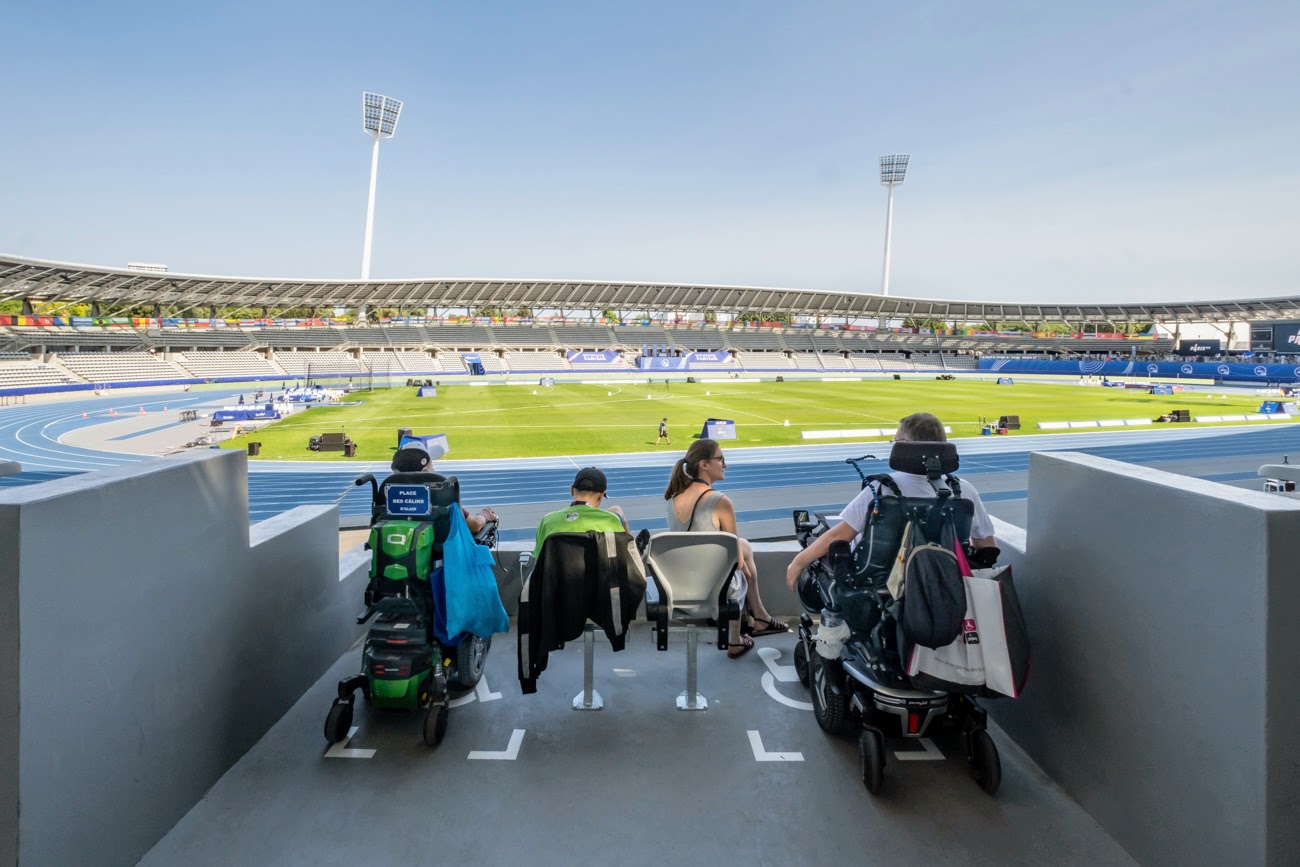
Accessibility - Stade Charléty (13th arrondissement)
Credit
Clément Dorval / Ville de Paris
The city is carrying out structural and permanent improvements to ensure the accessibility of competition sites:
-
repair damaged or non-functional pavements,
-
making road crossings safer: lowering kerbs, renovating warning and guidance strips, sounding traffic lights, clearing pathways, repairing pavement defects.
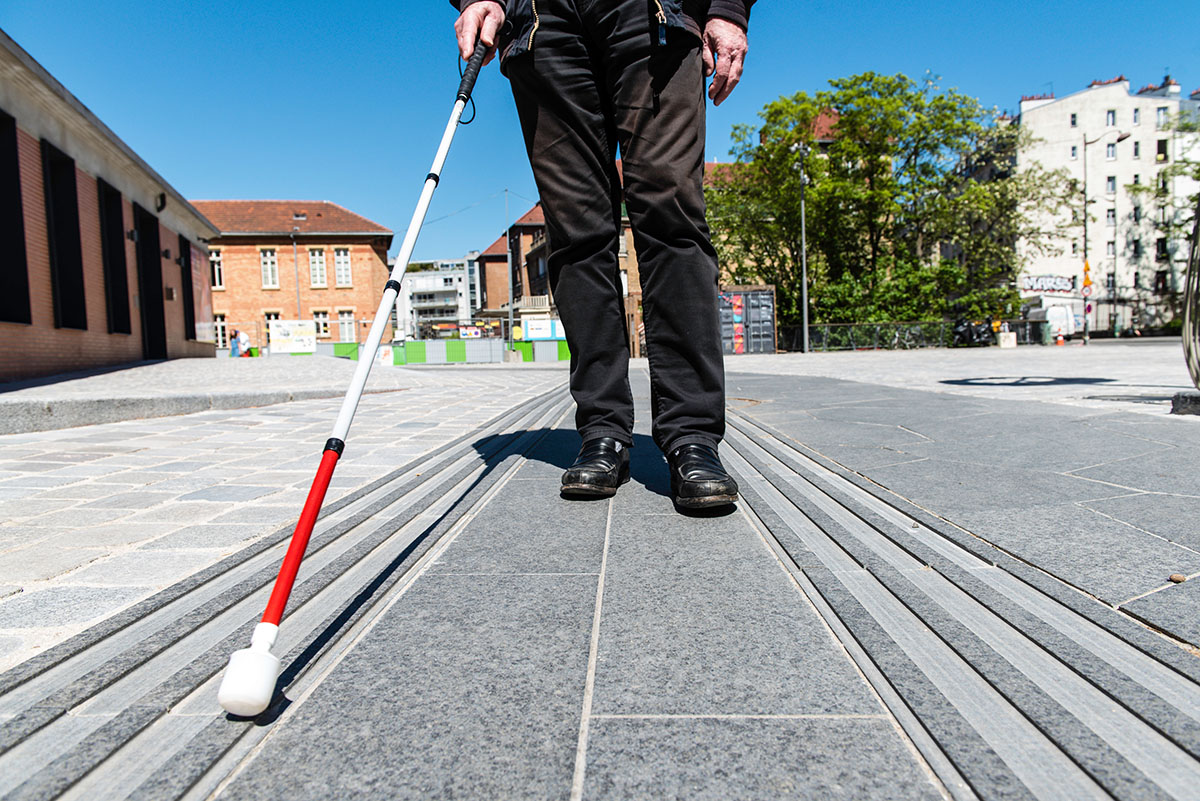
Credit
Emilie Chaix/Ville de Paris
New solutions developed during the Para Athletics World Championships show Paris Games intention to set an example. This is the case, for example, with the universal guidance application that guides users, step by step, through public transport to competition venues.
Guiding people through Ceremonies
During ceremonies such as the opening ceremony on the Seine, information on accessibility will be made available to everyone, regardless of disability.
Entrance, services and help for disabled people will be held on the upper quay of the Seine during the opening ceremony. People with disabilities will be able to get guidance from trained volunteers dedicated to welcoming and accompanying spectators with special needs.
Various devices adapted to different handicaps will make it easier for spectators to find their way around these areas and be autonomous:
-
audio beacons and tactile maps for the visually impaired,
-
audio induction loops to enable deaf and hard-of-hearing people with hearing aids to enjoy the sounds of the ceremony,
-
support for people with reduced mobility,
-
extra available wheelchairs if required,
-
creation of a dedicated area for wheelchair users and people with walking difficulties, so that they and their aids can sit down while maintaining a clear view of the screens or the Seine,
-
subtitling of all audio content broadcast on the screens and live translation by a sign language interpreter.
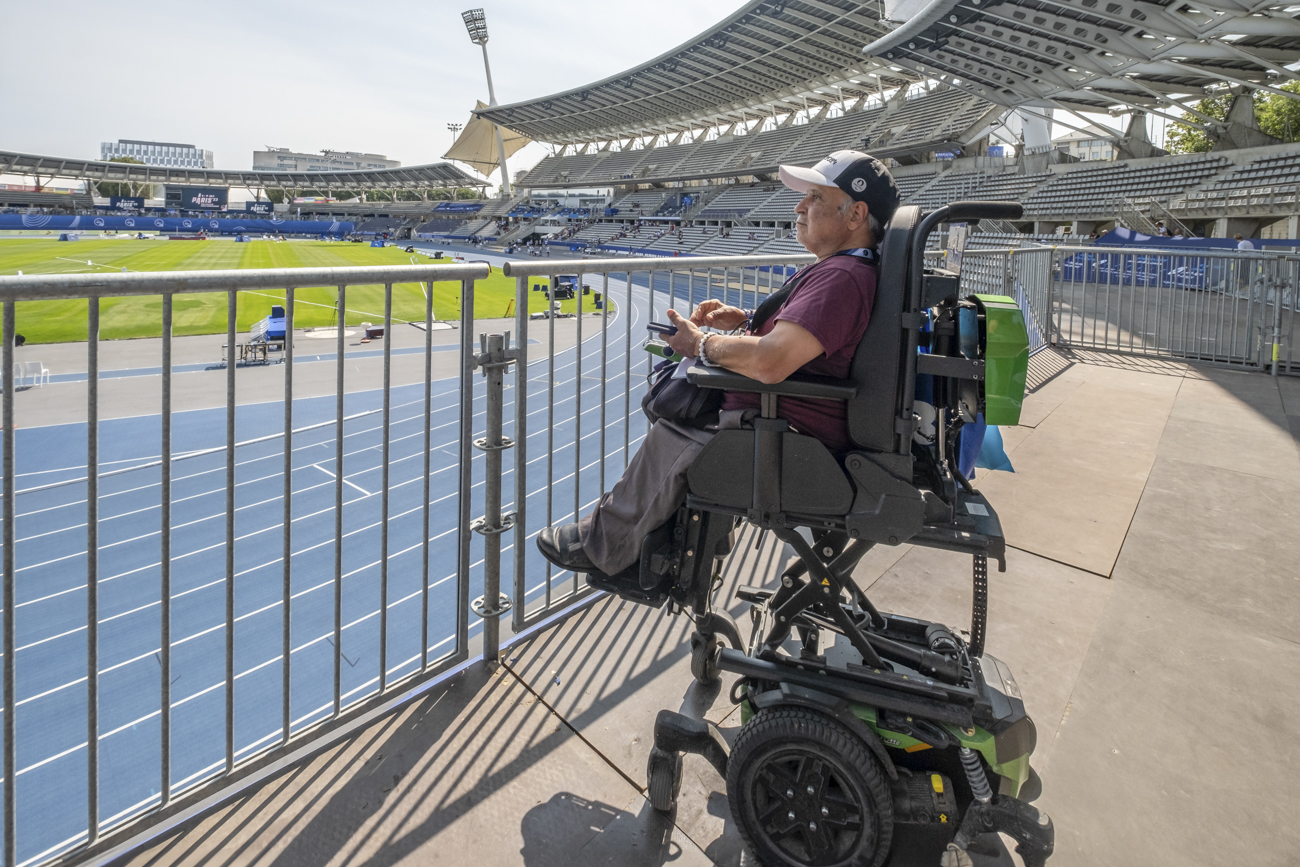
Credit
Clément Dorval / Ville de Paris
Competition sites
The Arena Porte de la Chapelle is a fine example of construction that includes increased accessibility, undifferentiated access for the general public, a sensory room and gender-neutral sanitary facilities. This universal design was rewarded by an Accessibility prize, a first for an Arena of this type.
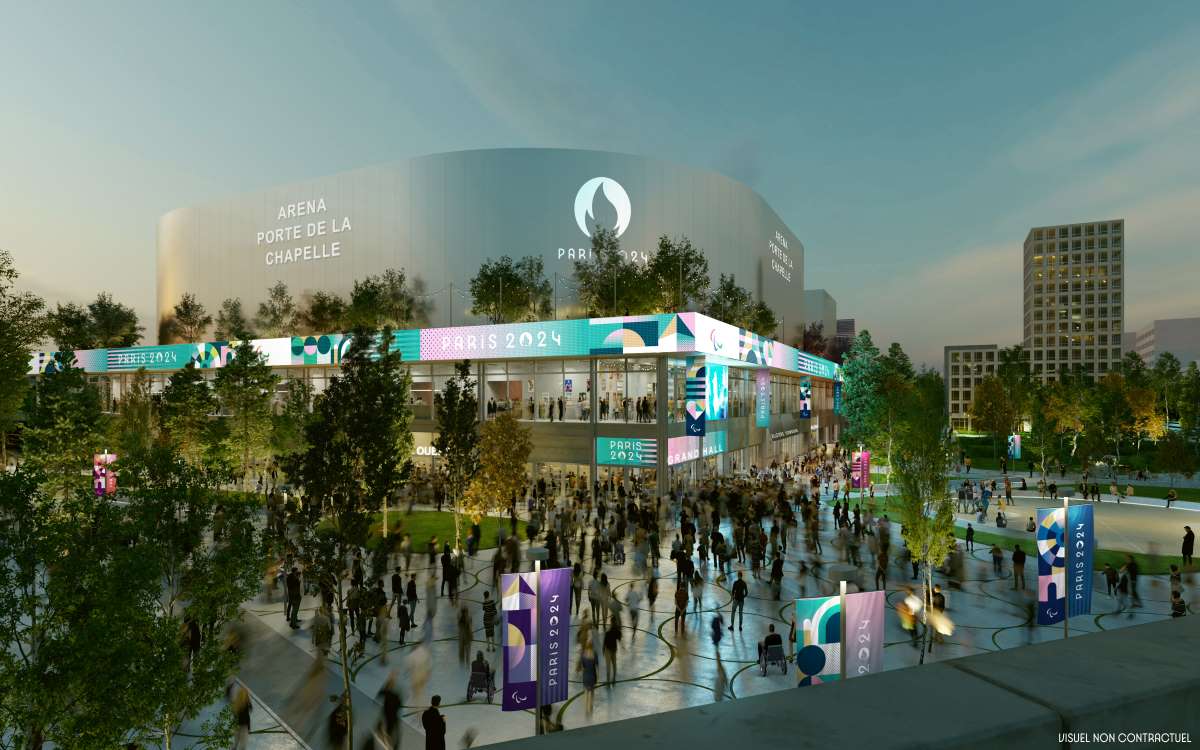
Credit
Paris 2024 / Ville de Paris – SCAU / NP2F
Celebration sites
Festivities at Hôtel de Ville will offer the same services as those provided on the upper banks of the Seine during the ceremony, with a syllabic chord keyboard service and simultaneous translation into sign language for speeches.
At local festivities, Paris Volunteers will be trained to welcome and guide disabled people if necessary.
Events will raise awareness of disabilities through an artistic approach showing off para-sports, thanks to local players. All festival sites will be barrier-free.
Paris Volunteers commitment
Throughout the competition, some 5,288 volunteers will be specifically trained to welcome people with disabilities. Located around competition venues, in railway stations and around tourist attractions, they will be the first point of contact for guiding and welcoming visitors during the Games.
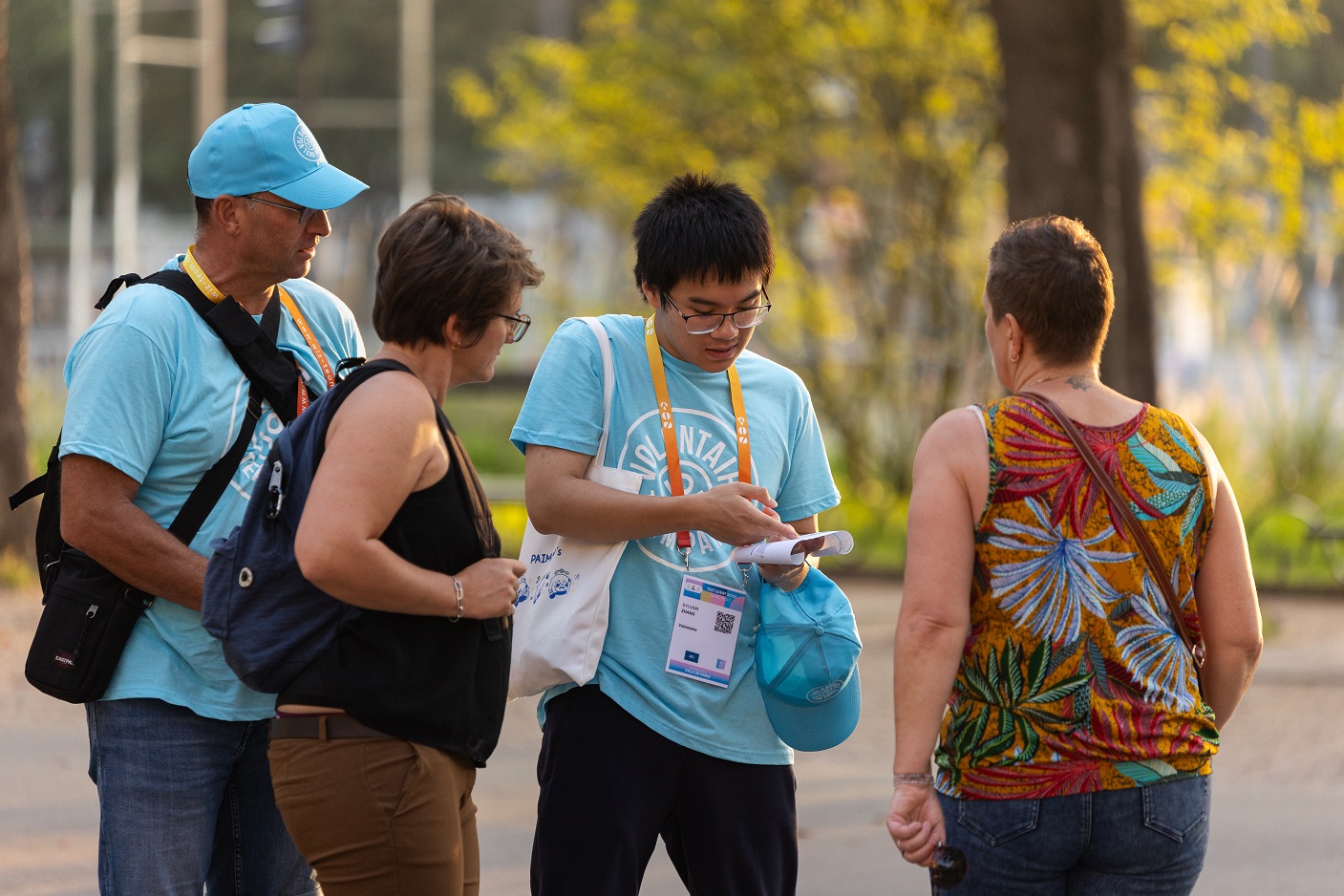
Paris Test Events 2023 volunteers
Credit
Guillaume Bontemps/Ville de Paris
What's more, 400 people with disabilities will be trained in a range of tasks in order to join the volunteer program.
What are accessible games? The answer with the Enjeux podcast!
The legacy of Games
Enhanced accessibility districts
Efforts to improve the city's accessibility are focused on 17 neighbourhoods of that are part of the enhanced accessibility scheme (QAA). Each arrondissement is now complete with an enhanced accessibility pathway between at least one accessible municipal facility in eight different public service sectors: sports facilities, health facilities, libraries, early childhood facilities, schools, leisure facilities, green spaces and places of worship.
Accessibility program
Authorities have launched an accessibility program for public municipal buildings that will provide improved access to 2,689 buildings. This operation will run until March 2025.
In 2022, in compliance with the law, 1,235 facilities were made accessible and 588 were in the process of being made compliant, i.e. 62% of public buildings were made accessible. By 2024, 72% will be accessible, and by 2025, 95% of these municipal facilities will comply.
As a whole, most of the city's facilities will be made more accessible. This is the aim of work underway at five sports venues that will be used for training athletes and parathletes during the Games: Pierre-de-Coubertin (16th), Max-Rousié (17th),Poissonniers (18th) and Bertrand-Dauvin (18th), and the Georges-Vallerey swimming pool (20th).
Retailers
During Paris Disability Month in June, a Paris Volunteers mission was carried out to mobilize shopkeepers to make their establishments accessible, and also to better reference places that are already accessible. Volunteers visited the "enhanced accessibility" districts of each arrondissement to register businesses on the Accès libre online platform.
This mission will be complemented by that of the Accessibility Volunteers. The City of Paris is recruiting two civic service volunteers per arrondissement to raise awareness among shopkeepers of their legal obligations and the possibilities for making their establishments accessible.
More para-hosting clubs
The City of Paris supports the development of para-sport activities for people with disabilities.
-
Paris Sport Handicap, free and accessible to all since 2010, is supported by 50 Centres Sport Adaptés (CSA), 13 Centres Handi-Jeunes (CHJ) and 6 sports activities for the deaf and hearing-impaired.
-
Bouge et Partage offers sports and theater sessions for disabled people, seniors and caregivers. More than 1,649 people, including 1,200 people with disabilities, have been able to take advantage of the scheme since October 2023, at 17 facilities.
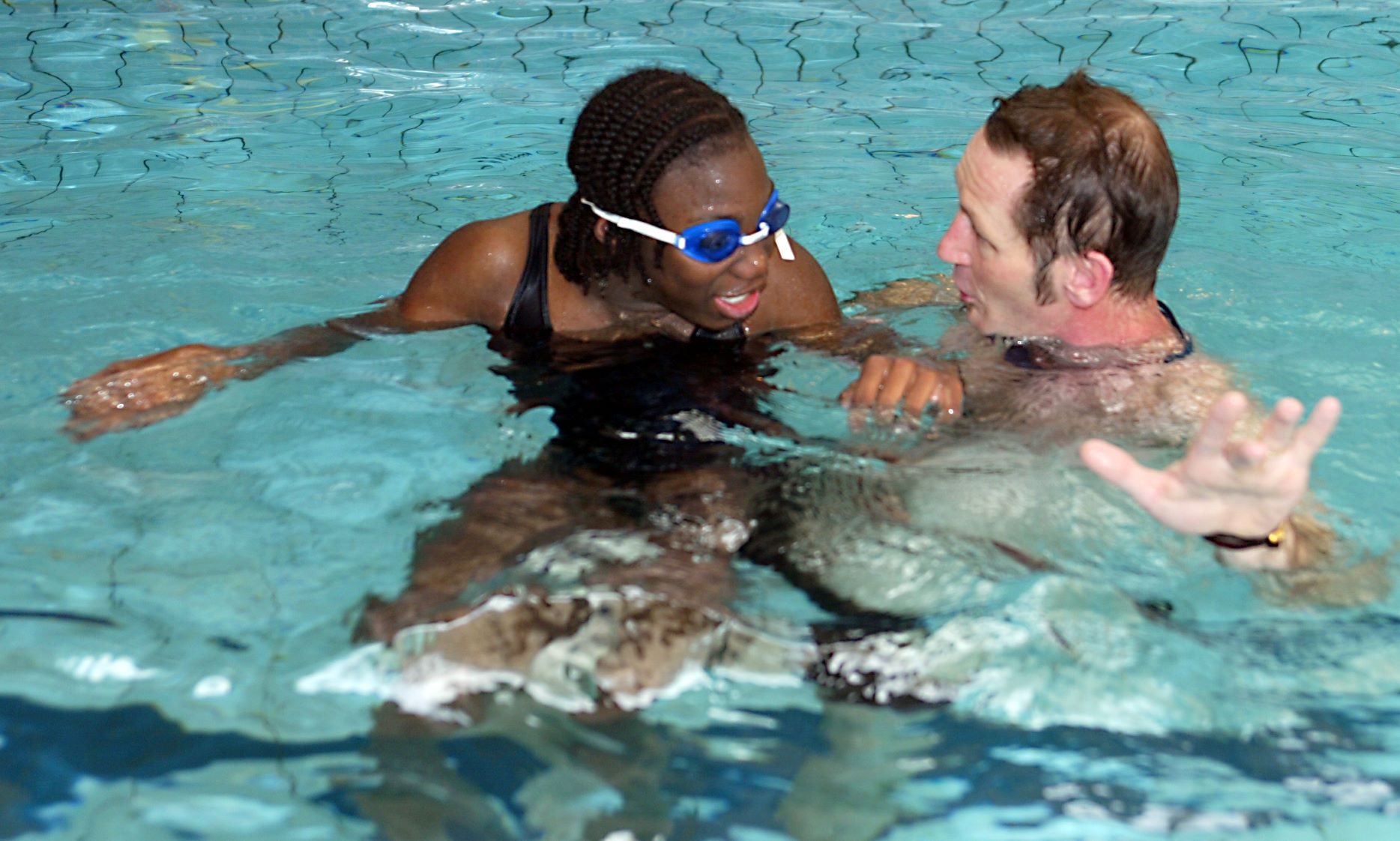
Credit
@Gérard Sanz/Ville de Paris
The city is also working in three complementary areas to develop parasport and make sport accessible to as many people as possible, as part of its strategy to make Paris more inclusive.
-
Creation of a comprehensive para-sport offering through a network of para-hosting clubs that builds on the existing sports fabric. To date, Paris has 23 para-sport clubs and 1,700 members. Twenty-eight new para-sport sections are due to open at the start of the 2023 school year, with a target of 40 by the end of 2024 to double the number of para-sport members. A variety of sports are represented: sitting volleyball (PUC), judo (Comité de Judo), athletics (Jeunesse Athlétique de Montrouge)…
-
To ensure that this new offer does not infringe on exisiting slots, the city is taking steps to find new practice spaces, particularly within social and medico-social establishments. The aim is also to welcome and enable the practice of third parties (ordinary schools, para-accommodating clubs, etc.) and thus encourage cooperation between these players. Today, 341 of the city's 479 sports facilities have disabled access.
-
The transmission of Paralympic culture and exchanges will be encouraged, particularly in schools. With this in mind, Paris hosted the first-ever Paralympic Day at the Place de la Bastille on October 8, and continues to use its events to showcase the city's para-sport offering.
Get all the news on disruptions and opportunities related to the Games with the Paris Infos Jeux 2024 newsletter.
We want to hear from you!
Was this information useful to you?
Please note: we cannot reply via this form (please do not include any personal information).
